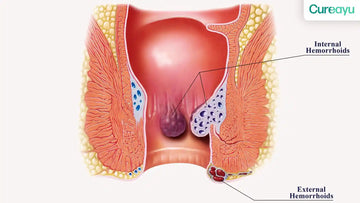A fistula is a medical condition that often goes unnoticed until it becomes severe, yet it significantly impacts an individual’s quality of life. It involves an abnormal connection between two body parts, such as organs, blood vessels, or intestines, which typically aren't connected. Recognizing the early symptoms of fistula is critical for prompt diagnosis and treatment to prevent complications.
In many cases, people may dismiss the early signs of a fistula, such as unusual discharge or discomfort, as minor health issues. However, ignoring these symptoms can lead to severe pain, infections, and even life-threatening conditions. This blog will delve into the causes, symptoms, reasons, and treatment options for fistula to enhance awareness and aid in early intervention.
Also Read: Hemorrhoids Symptoms: A Comprehensive Guide to Causes, Types, and Treatments
What Is Fistula Disease?
A fistula is an abnormal passageway that forms between two parts of the body, often caused by infection, injury, or inflammation. These passageways can occur in various areas, including the anus, rectum, urinary tract, or digestive system. For example:
- Anal Fistula: A common type where an infected gland near the anus creates a tunnel connecting the skin and the anal canal.
- Enteroenteric Fistula: Occurs between two segments of the intestines.
- Urinary Fistula: Develops between the urinary tract and another organ.
Fistulas can cause discomfort, pain, and complications if left untreated, requiring medical intervention for proper management.
Fistula Causes
- Chronic Infections
Prolonged infections in areas like the anal glands, intestines, or urinary tract can lead to tissue damage and the formation of fistulas.
- Example: Anal abscesses that do not heal properly can develop into an anal fistula.
- Inflammatory Bowel Diseases (IBDs)
Conditions like Crohn’s disease or ulcerative colitis are linked to fistula formation. These diseases cause chronic inflammation in the intestines, increasing the risk.
- Surgery or Trauma
Injury or complications from surgery can result in fistula formation, especially if healing is compromised.
- Example: Pelvic surgery may lead to rectovaginal fistulas.
- Radiation Therapy
Cancer patients undergoing radiation therapy may develop fistulas due to tissue damage caused by radiation.
- Tuberculosis (TB)
In regions where tuberculosis is prevalent, TB infections can cause fistula formation, especially in the gastrointestinal tract.
Also Read: The Difference Between Piles and Fissure: Symptoms, Causes, and Treatments
Fistula Symptoms
- Pain and Swelling
Localized pain, swelling, or tenderness near the affected area, such as the anus, is a common symptom. This pain often intensifies when sitting or during bowel movements.
- Abnormal Discharge
Persistent discharge of pus or blood from the affected area may occur, often accompanied by a foul odor.
- Skin Irritation or Infection
The skin around the fistula may become irritated, red, or swollen, leading to further discomfort.
- Recurring Abscesses
Recurrent abscesses near the fistula site indicate an underlying problem that requires medical attention.
- Difficulty in Passing Stool or Urine
Depending on the location, fistulas may cause difficulty or pain during urination or bowel movements.
Reason for Fistula
The primary reason for fistula formation is chronic tissue damage caused by infections, inflammation, or trauma. Repeated irritation and improper healing create a pathway for an abnormal connection to form. This can be exacerbated by conditions like Crohn’s disease, tuberculosis, or post-surgical complications.
Also Read: Navigating Dietary Choices: Essential Foods to Avoid in Piles for Better Digestive Health
Fistula Treatment
- Medications
For mild fistulas or underlying conditions, medications like antibiotics or anti-inflammatory drugs can help manage infections and reduce inflammation.
- Surgical Intervention
Surgery is often necessary for severe cases to close the abnormal connection. Common surgical procedures include:
- Fistulotomy: Involves opening and draining the fistula.
- Seton Placement: A surgical thread is placed to allow the fistula to drain and heal gradually.
- Minimally Invasive Procedures
- Fibrin Glue: This involves injecting medical glue into the fistula to seal it.
- Bioprosthetic Plugs: Biodegradable materials are used to close the fistula opening.
- Lifestyle Modifications
Maintaining hygiene, managing underlying conditions like Crohn’s disease, and avoiding prolonged sitting can prevent worsening symptoms and aid in recovery.
Conclusion
Fistulas are a serious medical condition that can significantly impact a person’s daily life if left untreated. Understanding the causes, symptoms, and available treatment options is crucial for early detection and effective management. Chronic infections, inflammatory diseases, and trauma are among the leading causes of fistula, with symptoms such as pain, discharge, and swelling signaling its presence.
Timely medical intervention, whether through medication, surgery, or lifestyle changes, can prevent complications and improve outcomes. If you experience any of the symptoms mentioned, consult a healthcare professional promptly. Early diagnosis and treatment can ensure better management and a quicker return to normal life.












